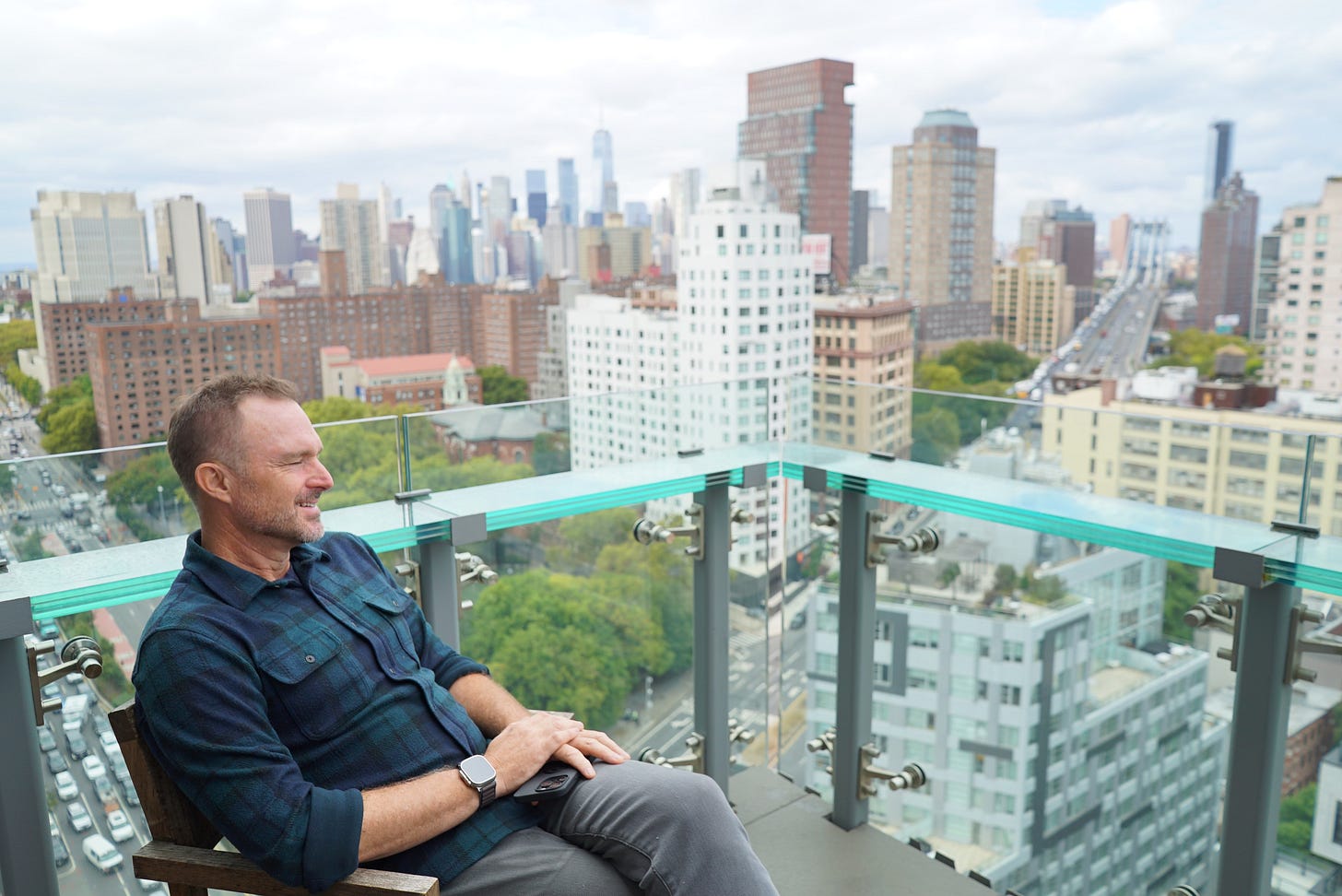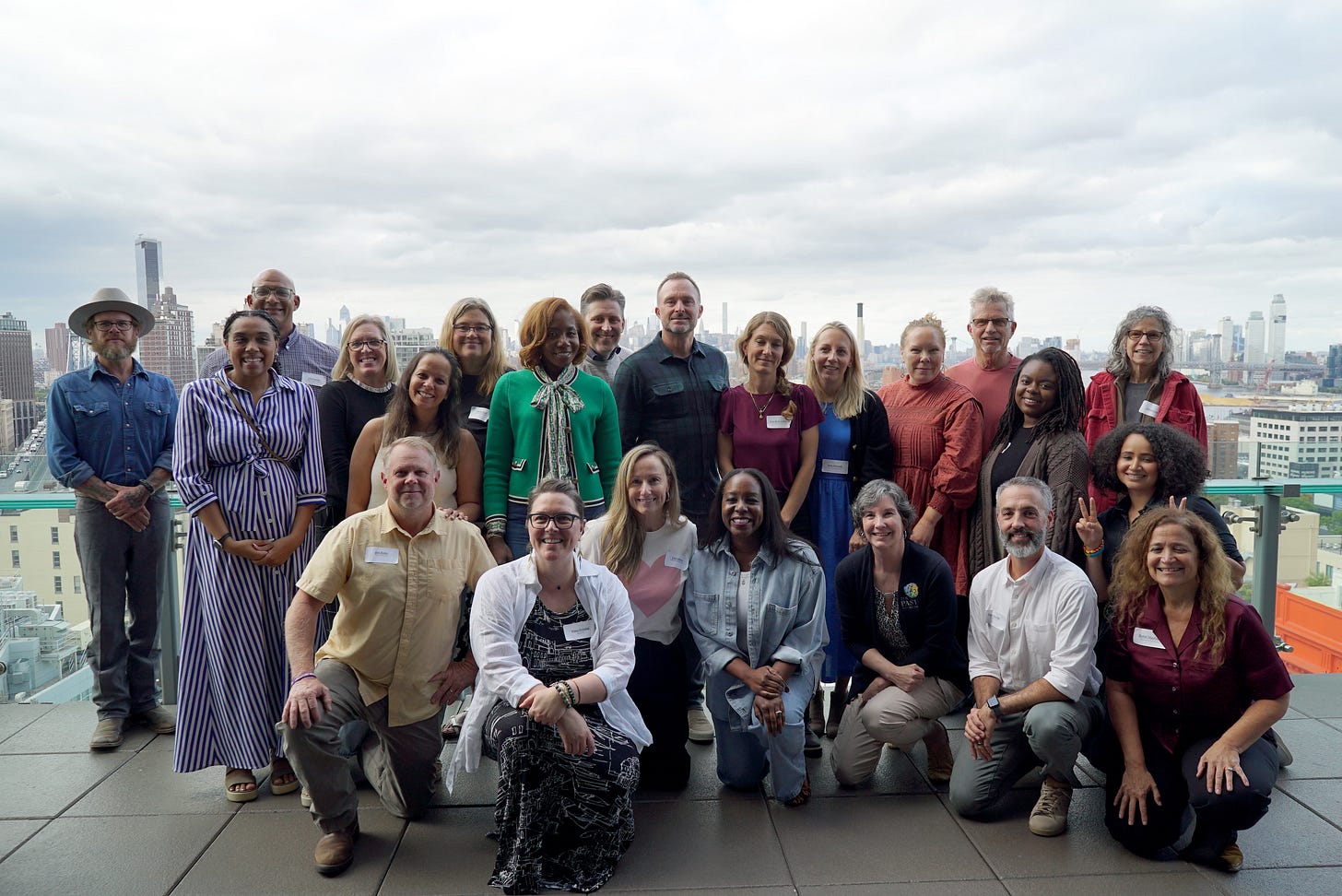Across the United States, A New Form of Education System Starts to Spread
In 2024 (and beyond), districts are OUT . . . & ecosystems are IN
Recently, from the rooftop balcony of a hotel in Brooklyn, I looked down on the borough that hosted my twenties.
Back then, at street level, everything around me felt like a mad frenetic swirl -- chaotic and inchoate. Seen from above, however, I could actually make sense of my beloved borough’s grander plan: its green spaces and thoroughfares, its water towers and roundabouts and HVAC systems -- the myriad components of a massive urban ecosystem, alive with the electricity of a weekday commute.
It was a fitting backdrop for a meeting of educators who are all in various stages of trying to fashion a different form of school system for their young people. “We’re here to bring learner-centered ecosystems to life across the country,” said Education Reimagined’s CEO and co-founder, Demi Edwards, addressing the representatives from the twelve communities her organization has invited to spend the coming year together. “To bear witness to each other’s visions, to look across the distances between us as we solve challenges, elevate bright spots, and show others outside this room that it is possible to reimagine education for a changing world.”
Education Reimagined’s big bet is that the best way to impact American education writ large is not primarily by seeding singular schools (as important as that is), but by reimagining the larger organizing principle of each community’s commitment to its children -- away from the sclerotic model of a “unified” district, and towards the nascent notion of a truly ecological approach in which a community’s full wealth of existing resources -- from its libraries to its public parks to its civic partners to, yes, its schools -- are intentionally woven together with a new set of organizations, adult roles, and learning pathways to result in a more vibrant set of everyday experiences for young people that are relevant, fulfilling, and perhaps even fun.
It’s a disruptive idea, spread across a diverse group of pilot sites. But Education Reimagined hopes that by weaving them together as a Learner-Centered Ecosystem Lab, each community can receive targeted support that can accelerate its effort to foster a vibrant learner-centered ecosystem -- and compile a playbook that helps other places follow suit.
In the coming year, I’ll visit each of these sites and share more detailed stories about their work, in hope of finding lasting answers to some stubborn questions.
How do you, for example, free kids to meaningfully move throughout their communities each day, and not just stay stuck in a single building?
When they are freed, how will adults keep track of where those learners are going, and what they’re learning?
And as we all recalibrate our relationship to content --and the role it plays in a student’s learning journey -- what roles should adults fill to best support the growth and development of the kids in their charge?
It’s a vital set of riddles, across a diverse range of pilot sites.
In Texas, Big Thought has been a national leader in arts education, out-of-school youth development, and social and emotional learning for over three decades. But now they’re seeking to bring Dallas’s different learning spaces together in order to create a more intentional ecosystem for the city’s young people.
In California, the community learning hub Rock Tree Sky is partnering with the Ojai school district, local non-profits, and businesses to try and reach every family in the Ojai Valley; while eight hours north on Highway 101, South Valley High in Ukiah is working with the Golden State’s Indigenous communities to integrate native pedagogy and promote student leadership.
In Rhode Island, an experiential out-of-school organization called FabNewport is working to ensure all youth have equitable access to mentorship and hands-on learning experiences across the county.
In Tennessee, a microschool called The Lab School of Memphis is searching for additional ways to grow its New School Learning (NSL) ecosystem across Tennessee and the surrounding states.
In Missouri, the Liberty Public Schools district, which serves over 12,000 students, is seeking to become more learner-centered by reimagining its assessment and accountability practices and expanding real world learning experiences in partnership with the wider community.
In Wisconsin, Norris, the smallest public district in the state, has retooled its learning programs to prioritize letting learners take a deep dive into understanding who they are and who they want to become.
In Ohio, a coalition of educators and civic leaders are weaving together their city’s resources in order to build the Columbus EcosySTEM initiative, and connect education, industry, and diverse communities to problem solve for the future of work and inspire life-long learning.
In Indiana, a public charter school founded by Purdue University and the City of Indianapolis is piloting a microschool to engage students who are underrepresented in STEM fields, and students who are first-generation college-bound.
In North Carolina, Spark NC is piloting a new approach to learning that expands pathways to high-tech fields through a unique, multi-district collaboration that is learner-centered, industry-relevant, and competency-based.
In New York, on the site of an abandoned airfield in Brooklyn, a coalition of educators and non-profits are designing Runway Green, a transformational educational ecosystem with pathways to careers in the Green Economy.
And across the country, the NACA Inspired Schools Network is working to establish schools that can prepare native youth for success in life while also promoting Indigenous culture, identity, and community investment.
“People across the country are envisioning something different for their children,” explained Bobbi Macdonald, a lifelong educator who is co-directing the work of the Lab. “In every community, we must become more fluent in honoring the uniqueness of each child, family, and community; valuing each child’s life goals and contexts; and preparing them to provide for themselves and their families.”`
To get there, Macdonald and co-director Alin Bennett are hoping the Lab’s participants can help model a living system that, Bennett says, “organizes, supports, and credentials learning in fundamentally different ways—creating learner-centered ecosystems that interweave the assets, experiences, and wisdom of local communities and the virtual world to support the growth and development of children.”






So great to see this fresh mindset taking hold across the country! Thanks for sharing, Sam.
Looks like the hotel must be on Flatbush Avenue, maybe the Tillary? Sorry to have missed you on this particular visit to Brooklyn, she you in this borough of Brooklyn next month!